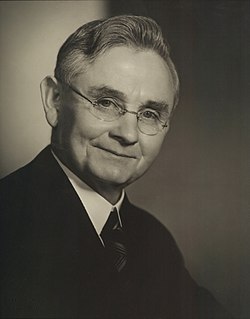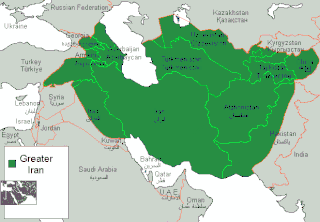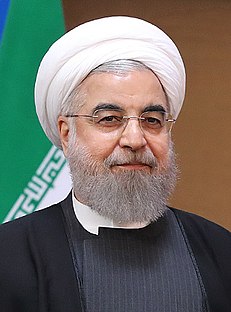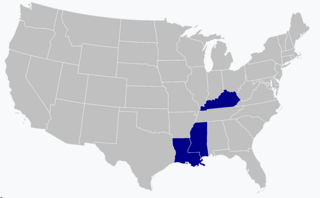
Azerbaijan, officially the Republic of Azerbaijan, is a country in the South Caucasus region of Eurasia at the crossroads of Eastern Europe and Western Asia. It is bounded by the Caspian Sea to the east, Russia to the north, Georgia to the northwest, Armenia to the west and Iran to the south. The exclave of Nakhchivan is bounded by Armenia to the north and east, Iran to the south and west, and has an 11 km long border with Turkey in the northwest.

Iran, also called Persia, and officially the Islamic Republic of Iran, is a country in Western Asia. With over 81 million inhabitants, Iran is the world's 18th most populous country. Comprising a land area of 1,648,195 km2 (636,372 sq mi), it is the second largest country in the Middle East and the 17th largest in the world. Iran is bordered to the northwest by Armenia and the Republic of Azerbaijan, to the north by the Caspian Sea, to the northeast by Turkmenistan, to the east by Afghanistan and Pakistan, to the south by the Persian Gulf and the Gulf of Oman, and to the west by Turkey and Iraq. The country's central location in Eurasia and Western Asia, and its proximity to the Strait of Hormuz, give it geostrategic importance. Tehran is the country's capital and largest city, as well as its leading economic and cultural center.

The 1980 United States presidential election was the 49th quadrennial presidential election. It was held on November 4, 1980. Republican nominee Ronald Reagan defeated incumbent Democrat Jimmy Carter. Due to the rise of conservativism following Reagan's victory, some historians consider the election to be a realigning election that marked the start of the "Reagan Era".

The Medes were an ancient Iranian people who spoke the Median language and who inhabited an area known as Media between western and northern Iran. Under the Neo-Assyrian Empire, late 9th to early 7th centuries BC, the region of Media was bounded by the Zagros Mountains to its west, to its south by the Garrin Mountain in Lorestan Province, to its northwest by the Qaflankuh Mountains in Zanjan Province, and to its east by the Dasht-e Kavir desert. Its neighbors were the kingdoms of Gizilbunda and Mannea in the northwest, and Ellipi and Elam in the south.
The Referendum Party was a Eurosceptic, single-issue political party that was active in the United Kingdom from 1994 to 1997. The party's sole objective was for a referendum to be held on the nature of the UK's membership of the European Union (EU). Specifically, it called for a referendum on whether the British electorate wanted to be part of a federal European state or to revert to being a sovereign nation that was part of a European free-trade bloc without wider political functions.
The October Surprise conspiracy theory refers to an alleged plot to influence the outcome of the 1980 United States presidential election, contested between incumbent president Jimmy Carter (D–GA) and his opponent, former California governor Ronald Reagan (R–CA).

The 1935 New Zealand general election was a nationwide vote to determine the shape of the New Zealand Parliament's 25th term. It resulted in the Labour Party's first electoral victory, with Michael Joseph Savage becoming the first Labour Prime Minister. The governing coalition, consisting of the United Party and the Reform Party, suffered a major defeat, attributed by many to their handling of the Great Depression. The year after the election, United and Reform took their coalition further, merging to form the modern National Party.

The Confederate States Congress was both the provisional and permanent legislative assembly of the Confederate States of America that existed from 1861 to 1865. Its actions were for the most part concerned with measures to establish a new national government for the Southern "revolution", and to prosecute a war that had to be sustained throughout the existence of the Confederacy. At first, it met as a provisional congress both in Montgomery, Alabama and Richmond, Virginia.

The Treaty of Turkmenchay was an agreement between Persia (Iran) and the Russian Empire, which concluded the Russo-Persian War (1826–28). It was signed on 10 February 1828 in Torkamanchay, Iran. By the treaty, Persia ceded to Russia control of several areas in the South Caucasus: the Erivan Khanate, the Nakhchivan Khanate, and the remainder of the Talysh Khanate. The boundary between Russian and Persia was set at the Aras River. These territories comprise modern-day Armenia, the southern parts of the modern-day Republic of Azerbaijan, Nakhchivan, as well as Iğdır Province.
Richard Nelson Frye was an American scholar of Iranian and Central Asian Studies, and Aga Khan Professor Emeritus of Iranian Studies at Harvard University. His professional areas of interest were Iranian philology and the history of Iran and Central Asia before 1000 CE.

Iranian presidential election of 1997 took place on 23 May 1997, which resulted in an unpredicted win for the reformist candidate Mohammad Khatami. The election was notable not only for the lopsided majority of the winner - 70% - but for the high turnout. 80% of those eligible to vote did so, compared to 50% in the previous presidential election.
Iranian Canadians or Persian Canadians are citizens of Canada whose national background is traced from Iran or are people possessing Iranian and Canadian dual citizenship. From the 2016 Canadian census, the main communities can be found in Southern Ontario, British Columbia, and Quebec. The vast majority, however, live in the northern suburbs of Toronto such as Richmond Hill, Vaughan, Markham, and Thornhill, and in the municipalities of Vancouver such as: North Vancouver, West Vancouver, Burnaby, and Coquitlam. As of 2016 a total of 97,110 Iranians reside in the Greater Toronto Area, 46,255 in the Greater Vancouver Area, 23,410 in the Greater Montreal Area, and the remainder are spread out in the other major cities in Canada based on the 2016 Canadian Census. These numbers represent the people who stated "Iranian" as their ethnic origin in the census survey.

Greater Iran is a term used to refer to the regions of the Caucasus, West Asia, Central Asia, and parts of South Asia that have significant Iranian cultural influence due to having been either long historically ruled by the various imperial dynasties of the Iranian Empire, having considerable aspects of Persian culture due to extensive contact with the various imperial dynasties of Iran, or are simply nowadays still inhabited by a significant amount of Iranian peoples who patronize their respective cultures. It roughly corresponds to the territory on the Iranian plateau and its bordering plains. The Encyclopædia Iranica uses the term Iranian Cultural Continent for this region.

Parliamentary elections were held in Iran on 8 March 1996, with a second round on 19 April. The Combatant Clergy Association and its allies emerged as the largest bloc in the Majlis, winning 110 of the 270 seats.
The 1937 Series was the second series of banknotes of the Canadian dollar issued by the Bank of Canada. The banknotes were issued into circulation on 19 July 1937, at which time the Bank of Canada began gradually removing banknotes from the 1935 Series from circulation. The $1000 banknote was issued several years later, as it was primarily used by chartered banks, which had a sufficient supply of the 1935 Series $1000 banknote.

Constitutional Convention elections were held in Iran on 3 and 4 August 1979. The result was a victory for the Islamic Republican Party. 10,784,932 voted in the elections, marking 51.71% turnout. Of all members elected, 68% were clerics.

Hassan Rouhani is an Iranian politician serving as the current and seventh President of Iran since 3 August 2013. He was also a lawyer, academic, former diplomat and Islamic cleric. He has been a member of Iran's Assembly of Experts since 1999, member of the Expediency Council since 1991, and a member of the Supreme National Security Council since 1989. Rouhani was deputy speaker of the fourth and fifth terms of the Parliament of Iran (Majlis) and Secretary of the Supreme National Security Council from 1989 to 2005. In the latter capacity, he was the country's top negotiator with the EU three, UK, France, and Germany, on nuclear technology in Iran, and has also served as a Shi'ite ijtihadi cleric, and economic trade negotiator. He has expressed official support for upholding the rights of ethnic and religious minorities. In 2013, he appointed former industries minister Eshaq Jahangiri as his first vice-president.
Reza Shah issued a royal decree on 15 August 1932 for the ninth parliamentary elections to be held, and the elections started on the following day. The elections are considered fraudulent and "systematically controlled by the royal court".

United States gubernatorial elections were held in 1935, in three states. Kentucky, Louisiana and Mississippi hold their gubernatorial elections in odd numbered years, every 4 years, preceding the United States presidential election year.














